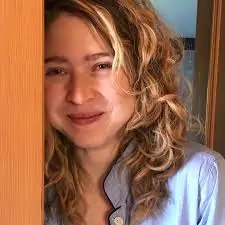
Claire Lucido, an independent film actress and gifted nonfiction writer who dedicated her life to telling the stories history nearly forgot, passed away on Tuesday, June 10, following a prolonged illness. She was just 38 years old.
Her husband, Ted Lucido, confirmed her passing in a heartfelt statement shared on social media:
“She was my light, full of song and laughter… her soulfulness and her silliness will always be a part of me.”
The couple, known for their quiet intimacy and shared creative life, were married on November 8 in a private ceremony.
Acting with Depth: From Indie Film to Experimental Stage
Lucido rose to prominence through her role in Teenage (2013), a critically acclaimed documentary by Matt Wolf that redefined how we view the history of youth culture. In dramatized sequences, Lucido portrayed a “Bright Young Thing” of the 1920s, delivering a nuanced performance that seamlessly blended historical accuracy with human vulnerability.
Wolf paid tribute to her in a moving post:
“She was an amazing writer and a longtime collaborator.”
Throughout the 2010s, Lucido appeared in independent films like Double Trouble (2015), My Sister Margaret (2016), and Killing Tigers (2018). Her performances were praised for their interior precision, emotional restraint, and a subtlety that set her apart from flashier contemporaries.
Lucido also thrived in downtown theater, performing in experimental works at spaces like Dixon Place and Guild Hall, where her genre-fluid artistry found fertile ground.
The Writer Behind the Curtain: Champion of Marginalized Histories
While her acting captured attention, Claire’s nonfiction writing left perhaps an even deeper imprint. Alongside collaborators, she co-authored a longform blog that explored marginalized histories, obscure movements, and underrepresented cultural moments. Her essays weren’t just informative—they were transformative.
A frequent writing partner described her as:
“An imaginative researcher who found idiosyncratic subjects and forgotten histories… she had a wildly creative and original mind.”
Claire’s topics ranged from 19th-century portraits of grief to labor unions hidden in American memory. She combined scholarly depth with lyrical accessibility—her pieces felt like intimate letters across time, inviting readers to care deeply about the past.
An Intellectual Force with Generous Spirit
Despite the challenges of her illness, Lucido remained a creative force to the end. She continued to write, revise unpublished works, and mentor younger researchers—an act of service that defined her ethos.
“She didn’t believe in gatekeeping,” one colleague said. “She lifted people up. Always.”
Those close to her remember how she made spaces feel more inclusive, more thoughtful, and deeply humane. She wasn’t interested in spotlight culture—she was interested in legacy.
Public Response and Memorial Plans
In the days following her death, tributes poured in across social media and the arts community. Matt Wolf shared behind-the-scenes photos of Lucido in full costume, exuding grace and strength. Guild Hall and members of New York’s independent theater scene expressed condolences, many emphasizing her collaborative warmth and unmistakable voice.
A public memorial is currently being planned for later this summer, with intentions to feature readings, film excerpts, and remembrances—a format Claire would have embraced.
FAQs About Claire Lucido
Q1: Who was Claire Lucido?
Claire Lucido was an independent actress and nonfiction writer, known for her work in Teenage (2013) and her blog focused on overlooked histories.
Q2: What is Claire Lucido known for?
She is best known for her role in Teenage and for her lyrical essays on marginalized history, cultural memory, and obscure historical subjects.
Q3: How old was Claire when she died?
Claire Lucido passed away at the age of 38.
Q4: Will there be a public memorial?
Yes, a public memorial is being planned for summer 2025, with film screenings, readings, and personal stories in her honor.
Q5: What is her legacy?
Claire’s legacy lies in her quiet brilliance—her ability to reveal beauty in forgotten stories, her depth as an actress, and her generous support of fellow artists and thinkers.
Conclusion: A Voice That Will Echo
Claire Lucido was more than a performer or writer—she was a cultural custodian, a seeker of beauty in forgotten corners, and a person who brought soulfulness and intellect into every room she entered. Whether on-screen, on-stage, or on the page, she changed the conversation—not loudly, but lastingly.
As her friends, collaborators, and admirers prepare to gather in her memory, they do so not in sorrow alone, but in deep gratitude for the gift of her voice.
Claire once wrote, “To be remembered is to be seen twice.”
In remembering her, we see the world—and ourselves—more clearly.
Leave a Reply